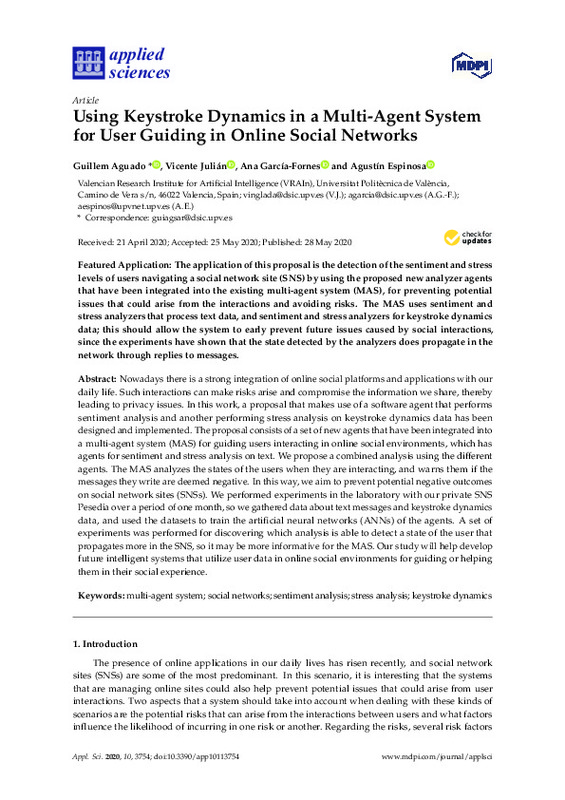JavaScript is disabled for your browser. Some features of this site may not work without it.
Buscar en RiuNet
Listar
Mi cuenta
Estadísticas
Ayuda RiuNet
Admin. UPV
Using Keystroke Dynamics in a Multi-Agent System for User Guiding in Online Social Networks
Mostrar el registro sencillo del ítem
Ficheros en el ítem
| dc.contributor.author | Aguado-Sarrió, Guillem
|
es_ES |
| dc.contributor.author | Julian Inglada, Vicente Javier
|
es_ES |
| dc.contributor.author | García-Fornes, A
|
es_ES |
| dc.contributor.author | Espinosa Minguet, Agustín Rafael
|
es_ES |
| dc.date.accessioned | 2021-05-20T03:34:16Z | |
| dc.date.available | 2021-05-20T03:34:16Z | |
| dc.date.issued | 2020-06 | es_ES |
| dc.identifier.uri | http://hdl.handle.net/10251/166534 | |
| dc.description.abstract | [EN] Nowadays there is a strong integration of online social platforms and applications with our daily life. Such interactions can make risks arise and compromise the information we share, thereby leading to privacy issues. In this work, a proposal that makes use of a software agent that performs sentiment analysis and another performing stress analysis on keystroke dynamics data has been designed and implemented. The proposal consists of a set of new agents that have been integrated into a multi-agent system (MAS) for guiding users interacting in online social environments, which has agents for sentiment and stress analysis on text. We propose a combined analysis using the different agents. The MAS analyzes the states of the users when they are interacting, and warns them if the messages they write are deemed negative. In this way, we aim to prevent potential negative outcomes on social network sites (SNSs). We performed experiments in the laboratory with our private SNS Pesedia over a period of one month, so we gathered data about text messages and keystroke dynamics data, and used the datasets to train the artificial neural networks (ANNs) of the agents. A set of experiments was performed for discovering which analysis is able to detect a state of the user that propagates more in the SNS, so it may be more informative for the MAS. Our study will help develop future intelligent systems that utilize user data in online social environments for guiding or helping them in their social experience. | es_ES |
| dc.description.sponsorship | This work was funded by the project TIN2017-89156-R of the Spanish government. | es_ES |
| dc.language | Inglés | es_ES |
| dc.publisher | MDPI AG | es_ES |
| dc.relation.ispartof | Applied Sciences | es_ES |
| dc.rights | Reconocimiento (by) | es_ES |
| dc.subject | Multi-agent system | es_ES |
| dc.subject | Social networks | es_ES |
| dc.subject | Sentiment analysis | es_ES |
| dc.subject | Stress analysis | es_ES |
| dc.subject | Keystroke dynamics | es_ES |
| dc.subject.classification | LENGUAJES Y SISTEMAS INFORMATICOS | es_ES |
| dc.title | Using Keystroke Dynamics in a Multi-Agent System for User Guiding in Online Social Networks | es_ES |
| dc.type | Artículo | es_ES |
| dc.identifier.doi | 10.3390/app10113754 | es_ES |
| dc.relation.projectID | info:eu-repo/grantAgreement/AEI/Plan Estatal de Investigación Científica y Técnica y de Innovación 2013-2016/TIN2017-89156-R/ES/AGENTES INTELIGENTES PARA ASESORAR EN PRIVACIDAD EN REDES SOCIALES/ | es_ES |
| dc.rights.accessRights | Abierto | es_ES |
| dc.contributor.affiliation | Universitat Politècnica de València. Departamento de Sistemas Informáticos y Computación - Departament de Sistemes Informàtics i Computació | es_ES |
| dc.description.bibliographicCitation | Aguado-Sarrió, G.; Julian Inglada, VJ.; García-Fornes, A.; Espinosa Minguet, AR. (2020). Using Keystroke Dynamics in a Multi-Agent System for User Guiding in Online Social Networks. Applied Sciences. 10(11):1-20. https://doi.org/10.3390/app10113754 | es_ES |
| dc.description.accrualMethod | S | es_ES |
| dc.relation.publisherversion | https://doi.org/10.3390/app10113754 | es_ES |
| dc.description.upvformatpinicio | 1 | es_ES |
| dc.description.upvformatpfin | 20 | es_ES |
| dc.type.version | info:eu-repo/semantics/publishedVersion | es_ES |
| dc.description.volume | 10 | es_ES |
| dc.description.issue | 11 | es_ES |
| dc.identifier.eissn | 2076-3417 | es_ES |
| dc.relation.pasarela | S\417995 | es_ES |
| dc.contributor.funder | Agencia Estatal de Investigación | es_ES |
| dc.description.references | O’Keeffe, G. S., & Clarke-Pearson, K. (2011). The Impact of Social Media on Children, Adolescents, and Families. PEDIATRICS, 127(4), 800-804. doi:10.1542/peds.2011-0054 | es_ES |
| dc.description.references | George, J. M., & Dane, E. (2016). Affect, emotion, and decision making. Organizational Behavior and Human Decision Processes, 136, 47-55. doi:10.1016/j.obhdp.2016.06.004 | es_ES |
| dc.description.references | Thelwall, M. (2017). TensiStrength: Stress and relaxation magnitude detection for social media texts. Information Processing & Management, 53(1), 106-121. doi:10.1016/j.ipm.2016.06.009 | es_ES |
| dc.description.references | Aguado, G., Julian, V., & Garcia-Fornes, A. (2018). Towards Aiding Decision-Making in Social Networks by Using Sentiment and Stress Combined Analysis. Information, 9(5), 107. doi:10.3390/info9050107 | es_ES |
| dc.description.references | Schouten, K., & Frasincar, F. (2016). Survey on Aspect-Level Sentiment Analysis. IEEE Transactions on Knowledge and Data Engineering, 28(3), 813-830. doi:10.1109/tkde.2015.2485209 | es_ES |
| dc.description.references | Lee, P.-M., Tsui, W.-H., & Hsiao, T.-C. (2015). The Influence of Emotion on Keyboard Typing: An Experimental Study Using Auditory Stimuli. PLOS ONE, 10(6), e0129056. doi:10.1371/journal.pone.0129056 | es_ES |
| dc.description.references | Vizer, L. M., Zhou, L., & Sears, A. (2009). Automated stress detection using keystroke and linguistic features: An exploratory study. International Journal of Human-Computer Studies, 67(10), 870-886. doi:10.1016/j.ijhcs.2009.07.005 | es_ES |
| dc.description.references | Huang, F., Zhang, X., Zhao, Z., Xu, J., & Li, Z. (2019). Image–text sentiment analysis via deep multimodal attentive fusion. Knowledge-Based Systems, 167, 26-37. doi:10.1016/j.knosys.2019.01.019 | es_ES |
| dc.description.references | Mehrabian, A. (1996). Pleasure-arousal-dominance: A general framework for describing and measuring individual differences in Temperament. Current Psychology, 14(4), 261-292. doi:10.1007/bf02686918 | es_ES |
| dc.description.references | Ulinskas, M., Damaševičius, R., Maskeliūnas, R., & Woźniak, M. (2018). Recognition of human daytime fatigue using keystroke data. Procedia Computer Science, 130, 947-952. doi:10.1016/j.procs.2018.04.094 | es_ES |








